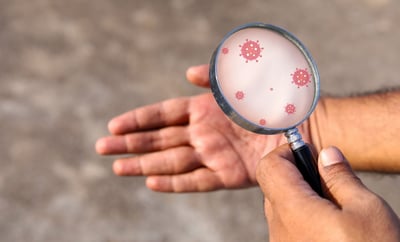
As if the relentless itching and scratching weren’t bad enough…
If you’re suffering from persistent skin itchiness—maybe on your scalp, hands, face, neck, or somewhere else—you at least expect to see some kind of rash or inflamed area. And if you can see it, then something can be done about it, right?
But what do you do when the itchy area looks normal? Is it possible to have an invisible “rash,” something you can certainly feel but not see?
Unfortunately, yes. Invisible rashes are both perplexing and maddening—causing symptoms typically associated with a rash such as itching, burning, or general discomfort—without any of the normal visible signs on the skin.
So, what’s going on, and what do you do about it?
Invisible rash, actual consequences
While the rash may be nonexistent, the struggle certainly feels real. The itching, burning and tingling can limit your productivity and affect your ability to concentrate on daily tasks, and can add stress and anxiety to your life. (And that extra stress can even create a vicious cycle that causes even more itching!) To make matters worse, scratching may only provide temporary relief and sometimes causes the itch to come back even worse.
Itchy skin—sometimes known by its medical term, pruritus—can also keep you awake at night, and that sleep disruption can further impact your mental and physical well-being. Let’s not forget constant scratching can be embarrassing when you’re around others, which may cause you to avoid certain clothes or activities you enjoy.
Some healthcare providers even struggle to offer a diagnosis, which may cause you to start doubting yourself: “Is this all in my head?” If you’re dealing with persistent itchiness, make an appointment with a Forefront dermatologist, who can diagnose the problem and recommend treatment.
Common causes of itchiness without a noticeable rash
Eczema, which is a general term for conditions that cause irritated skin, is one of the most common causes of itching. And a type of eczema called contact dermatitis occurs after contact with an irritant or allergen. Both conditions can cause itchiness characteristic of a rash without the appearance of one. Sometimes, the rash simply hasn’t developed yet, while other times the rash is mild enough to be almost invisible. Stress and hormonal changes can even trigger symptoms usually associated with eczema without causing a rash to appear.
However, never dismiss persistent itching or assume it’s all in your head. It’s important to see your dermatologist to uncover the true cause of the condition. The good news is that most cases of persistent itchiness have straightforward (and easily treated) causes:
Dry skin. When the skin loses moisture, which is especially common in winter, it can begin to itch and appear flaky or scaly. Try switching away from soaps with harsh chemicals, start using a humidifier, and apply moisturizer regularly.
Bug bites. Some spider and mosquito bites can inflame the skin surrounding the bite, causing itchiness. And while bug bites leave behind a small hole, they’re often too small to see. Try to avoid scratching the area, which can make matters worse, and instead try a cold compress or a steroid cream.
Medication reaction. Some people are sensitive to certain prescription opioid pain relievers, including morphine, fentanyl, and acetaminophen, as well as some medications that lower blood pressure. If you suspect this may be the cause, consult your doctor before stopping any of your medications.
Less common causes of itchiness without a noticeable rash
Itchy skin can also be a symptom of other diseases and conditions, so make sure you tell your dermatologist about any medical issues you’re dealing with to help them present the most appropriate solution for you:
Nerve issues. A condition known as neuropathic itch—often as a result of diabetes, multiple sclerosis or shingles—is caused by damage to the nervous system rather than any issue with the skin itself. These damaged nerves can send incorrect signals to the brain, which may misinterpret them as itchiness. Neuropathic itch often gets worse with scratching.
Kidney disease. While the cause is unknown, kidney disease has been proven to cause itchiness without a noticeable rash. If you feel this may be the cause, your doctor can conduct tests to assess how well your kidneys are working and prescribe a treatment plan. Your dermatologist may also prescribe medication to help with the itchiness.
Thyroid issues. Both hypothyroidism and hyperthyroidism can cause dry skin (which can become itchy), and the hormonal imbalance that usually accompanies thyroid issues can disrupt your skin’s natural barrier, which can cause itchiness without a noticeable rash.
Immune system abnormalities. Research published in the Journal of the American Academy of Dermatology reports that an imbalanced immune system—including both low and elevated levels of certain immunoglobulins and T-cells—can cause chronic itching. Principal investigator Brian S. Kim, MD, with Washington University School of Medicine in St. Louis, shared the challenge of itchiness associated with an immune system disorder:
“As doctors, we throw things like antihistamines, ointments, and lotions at patients who suffer chronic itching, but if there is something profoundly abnormal about the immune system … then we can’t solve the itching until we address those underlying causes.”
Get results you can see (and feel)
Dealing with itchy skin, especially chronic itchiness that never seems to go away or produce a noticeable rash, can not only be frustrating but also make you miserable. While the reason may be hard to determine by yourself, a board-certified Forefront dermatologist can not only find the root cause, but also help you avoid all the relentless scratching (and plenty of sleepless nights).
Find your nearest Forefront office today, and get the relief you’ve been itching for!





